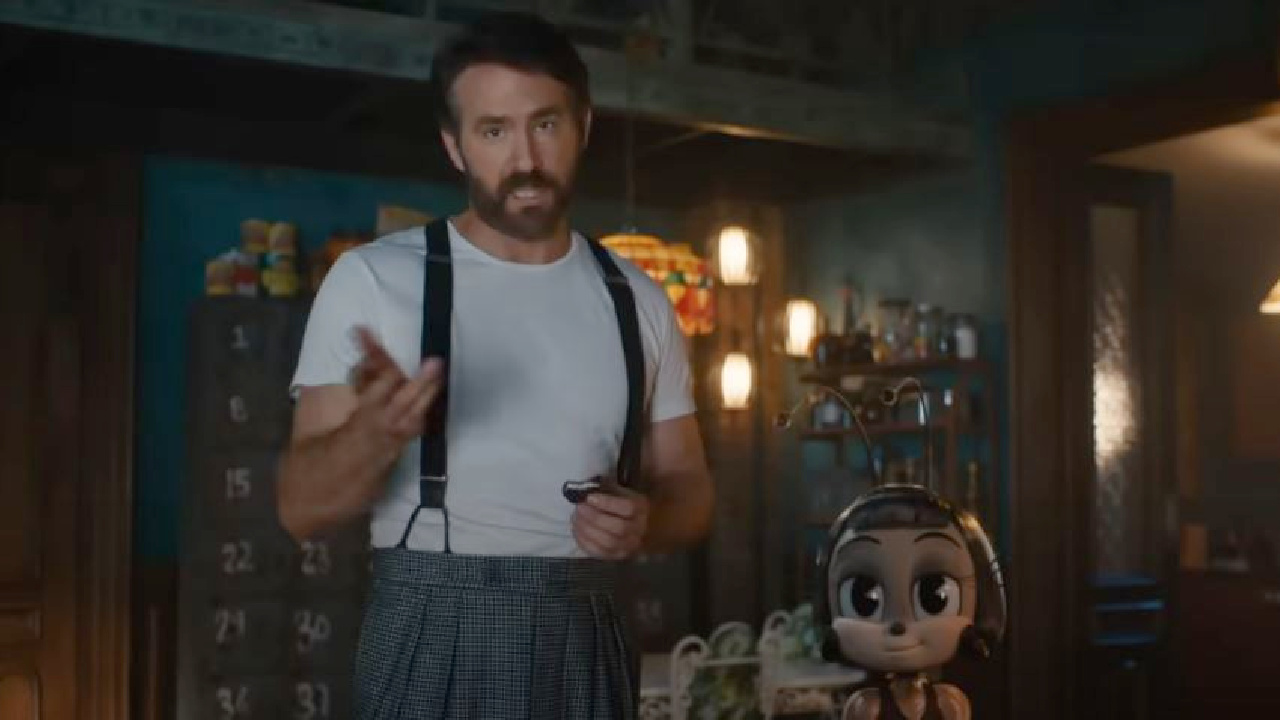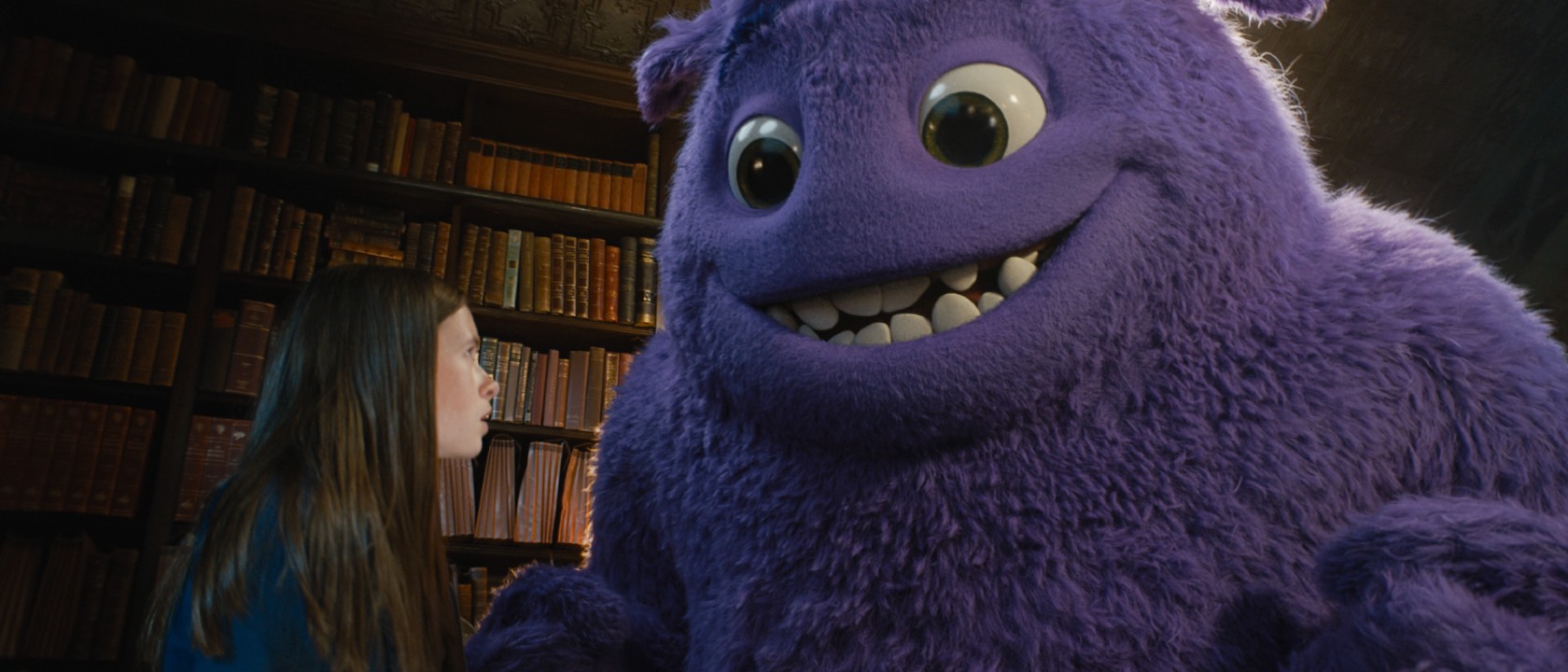As adults, it’s hard to let our imaginations run as wild as they once did when we were kids. Pretending to have superpowers and creating fantastical worlds with friends are all things that get left behind at some point or another. However, John Krasinski’s film IF – which he both wrote and directed – is proof that you don’t have to be a kiddo to have fun using your imagination, and his joy and optimism shine so bright in this film that it's infectious.

Release Date: May 17, 2024
Directed By: John Krasinski
Written By: John Krasinski
Starring: Cailey Fleming, Ryan Reynolds, John Krasinski, Fiona Shaw, Steve Carell, Phoebe Waller-Bridge, Louis Gossett Jr., Sam Rockwell, Sebastian Maniscalco, Christopher Meloni and Bradley Cooper
Rating: PG for thematic elements and mild language.
Runtime: 104 minutes
IF follows Bea (Cailey Fleming) as she’s whisked into a world of IFs (imaginary friends) after a chance run-in with a mysterious man named Cal (Ryan Reynolds). He introduces her to all the one-of-a-kind IFs he’s helping find new homes because the kids who created them grew up. From there, the film follows our young protagonist as she helps creatures like a giant purple monster named Blue (Steve Carell), a ballet butterfly named Blossom (Pheobe Waller-Bridge) and many more find homes again.
This film is a reminder that it’s important to keep our inner child alive, and it’s a call to action to get back in touch with imagination. All-in-all, it’s a wildly creative and optimistic tale that is equal parts moving and silly, and while it has one minor downfall, the heart and moral at the center of it makes it irresistible.
John Krasinski’s creativity and optimism is infectious.
The primary reason IF shines lies within writer-director John Krasinski’s vision. He let his own imagination explode onto the screen, and through this colorful world he’s created, you can’t help but feel as optimistic and hopeful as the characters in this movie.
Beginning with gem-toned warm sets in Bea's home and moving into the mystical world of IFs under Coney Island, the mix of Kris Moran’s set decoration and Janusz Kaminski’s golden cinematography help welcome audiences into Krasinski's warm creation. The set decoration and photography is what makes the perfect playground for Bea and the IFs.
Developed by John Krasinski himself, the imaginary friends are a hodgepodge of wild characters – Bradley Cooper plays a glass of ice water who is angry about living in Arizona, for example – that are irresistible to watch, and all you want to do is help them. So, when Bea and Cal set out to assist Blue and his friends, which include Christopher Meloni’s aggressive noir investigator Cosmo, Emily Blunt’s unicorn and Matt Damon’s sunflower therapist (among many others), it’s impossible not to root for this team to succeed in helping humans believe in their imaginary friends again.
Being in this magical world Krasinski created is honestly overwhelming in the best way, as proven by a scene early in the movie when we meet all the IFs and get to know how they live. Seeing all their unique rooms – like a vivid art classroom and a blue bakeshop – ignited my imagination and left me yearning for my childhood and reminiscing about my own childhood creativity. The love John Krasinski has is apparent and painted all over this movie.
While I love the creative world of the imaginary friends, the third act and the rules surrounding IFs falls short.
It's easy to get on board with the IFs and excited about the mission to help them find new homes. Learning about how they were imagined in the first place and seeing Bea travel through New York City with Cal looking for the the right people is a blast.
However, things got a bit muddled when it comes to IF logic. The solution to the IFs problems, generally speaking, is they are trying to reconnect with humans so they can be seen. However, most of the cases are treated differently, and it is hard to tell if the humans actually reconnect with their imaginary friend. For that reason, the third act falls a bit short and the ending isn't as satisfying as it could have been.
Questions regarding when humans can see IFs are a bit distracting during the third act specifically. On many occasions watching the movie, I found myself not fully understanding why Bea could see all the IFs when others could only see one or none. I also couldn’t fully figure out if other humans were able to see their own imaginary friends.
While this world is supposed to be fantastical and nonsensical in a way, the first two-thirds follow a fairly strict logic: the IFs kids stopped believing in their imaginary friends, therefore the friends can't be seen. So, when it gets to the point when they figured out how IFs could interact with others, it doesn't make sense, and the film starts to fall off.
While distracting at points, overall, this qualm is really nothing more than a minor concern. Without thinking too hard about it, the IFs mission is simple and the heart and morals make up for this critique.
The heart and moral of the story in IF more than makes up for its lackings.
From the first minutes of IF, themes of love, imagination, hope and memory are prominent and emphasized.
Playing Bea's dad, John Krasinski’s character tells his daughter to go out and find one “heck of a story” to tell him, and his focus on imagination and fun propels her to Cal and the IFs. Later, Lewis, a loving old bear played by Louis Gossett Jr., relays the other major message of the story, noting that anyone can be anything they want, “all you need is a little imagination.” These two great life lessons culminate with the idea that “nothing you love can ever be forgotten; you can always go back.”
The mystery of this movie revolves around memories Bea has seemingly forgotten. However, by embracing her imagination and opening her heart to others to create a big and beautiful story, she’s able to harness her old memories and find joy in them.
That’s something everyone can learn from, and this universal lesson in IF is equally valuable for kids and adults. For the younger crowd, appreciating and harnessing that imagination while their young is vital. For adults, learning how to tap back into their inner child is what this movie encourages.
All around, IF is a heartwarming great time steeped in care and creativity, and it’s a film that feels like it will do a lot of good as people of all ages dive into John Krasinski’s colorful world of imaginary friends.

Riley Utley is the Weekend Editor at CinemaBlend. She has written for national publications as well as daily and alt-weekly newspapers in Spokane, Washington, Syracuse, New York and Charleston, South Carolina. She graduated with her master’s degree in arts journalism and communications from the Newhouse School at Syracuse University. Since joining the CB team she has covered numerous TV shows and movies -- including her personal favorite shows Ted Lasso and The Marvelous Mrs. Maisel. She also has followed and consistently written about everything from Taylor Swift to Fire Country, and she's enjoyed every second of it.











